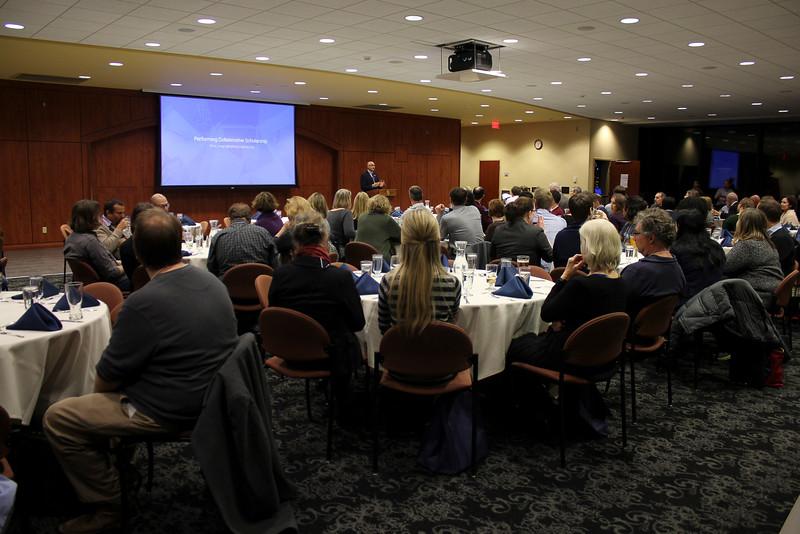Digital Scholarship Conference engages educators in collaboration and technology discussion
November 20, 2014
The University’s Digital Scholarship Center (DSC) hosted its first annual Digital Scholarship Conference on Nov. 14-16. The theme of the conference was “Collaborating Digitally: Engaging Students in Faculty Research,” and over 50 projects were submitted by many research institutes to be presented over the two-day conference.
The conference was organized by Emily Sherwood, a Postdoctoral Fellow in Digital Scholarship, and invited research institutes to submit research projects for discussion and exploration. The conference began with a tour of the Ellen Clarke Bertrand Library, home to the Digital Scholarship Center, followed by a keynote speech delivered by Chris Long, associate dean of Graduate and Undergraduate Education (Penn State University), on “Performing Digital Scholarship.”
The next two days were filled with over 50 presentations in the form of research papers, round-table discussions, and a poster session, broken up by cocktail hours and dinners that served to allow members of different institutions to meet one another and share their different perspectives on digital scholarship in the academic world. The second keynote speech was delivered by Assistant Professor (University of North Carolina, Chapel Hill) Zeynep Tufekci on “Researching Out Loud: Public Scholarship as a Process of Publishing Before and After Publishing.”
“Digital scholarship facilitates connections between coursework, research, and scholarly engagement that extend beyond Bucknell for faculty and students alike,” Director of Instructional Technology Matt Gardzina said.
The DSC was opened in February 2014, funded in part by a $700,000 grant from the Andrew W. Mellon Foundation. The DSC is home to technology such as Google Glass and a 3D printer.
The DSC was created with the goal of incorporating and utilizing ground-breaking technology to improve the quality of education and innovation at the University, combined with an “open access” initiative to ensure that scholarship is available to the greatest amount of students and researchers. Many courses and programs on campus utilize the DSC and the technological experts who work there to find innovative ways to conduct research.
“Our job is to engage intellectually with faculty and students in finding the most appropriate tool for their educational goal or method of inquiry,” Digital Scholarship Coordinator Diane Jakacki said.
“There is no hard evidence to prove that technology actually has a positive effect on learning, apart from it maybe being more engaging to watch a YouTube video than reading a textbook,” Brian Gockley, assistant director of the Teaching and Learning Center, said.
However, the DSC is focused on increasing productivity both in terms of technology and learning techniques. The setup of the DSC places emphasis on group collaboration, not just the technological advances and how this can influence student and faculty research.





















